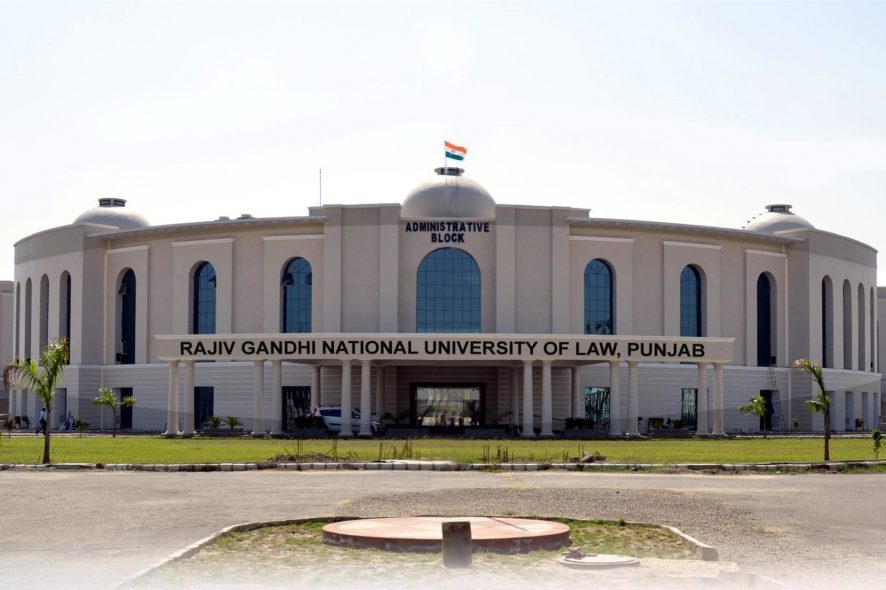About Rajiv Gandhi National University of Law:
The Rajiv Gandhi National University of Law, Patiala (RGNUL) is an autonomous National Law University (NLU) established by the RGNUL Act (No. 12 of 2006) passed by the Legislature of the State of Punjab, under the second wave of reforms instituted by the Bar Council of India. Established in 2006, RGNUL has garnered a pan-India reputation as a stellar institution for legal research and education. In May 2015, RGNUL became the first and the only NLU to have been accredited by the National Assessment and Accreditation Council (NAAC) with an ‘A’ grade. In March 2018, RGNUL was amongst the four NLUs to have been granted an autonomous status by the University Grants Commission.
The University has been ranked among the top 10 law schools in India in the National Institutional Ranking Framework (NIRF), by the Union Ministry of Human Resource Development, Government of India.
About Rgnul Financial and Mercantile Law Review:
RGNUL Financial and Mercantile Law Review (RFMLR) is a bi-annual, student-run, double-blind peer-reviewed law journal published by the Rajiv Gandhi National University of Law, Punjab. The Journal was first published in the year 2014 and gives an opportunity to the legal academia, legal professionals, and law students to contribute cutting-edge doctrinal and empirical research in the field of business and commercial laws. The Journal is indexed on SCC Online and has been ranked amongst the ten most accessed law school journals by SCC Online. The Editorial Board also collaborates with various legal experts and undertakes various academic initiatives to promote study and research in the field of business and commercial laws.
In our previous issues, the Peer Board of the Journal has been graced by the presence of various legal luminaries from top law firms in India, including Shardul Amarchand Mangaldas & Co., Khaitan & Co., J. Sagar Associates, Cyril Amarchand Mangaldas, Anand & Anand, Nishith Desai Associates, Economic Laws Practice, Talwar Thakore & Associates, Kochhar & Co., Dua Associates, and more. Further, the Journal has previously received guest articles from leading professionals and academicians from top law firms and law schools across India.
The Editorial Board has also organized a Colloquium on GST Laws in association with Lakshmikumaran & Sridharan Attorneys in February 2020, which witnessed participation from industry professionals as well as students across India.
About Volume VIII Issue II
In the past, RFMLR has usually invited submissions on specific fields of business laws. However, given the considerable developments in every field of business law in the past year, the Editorial Board is pleased to invite submissions pertaining to all areas of business and allied laws for Volume VIII Issue II. The author(s) can make submissions pertaining to various areas of business and commercial laws such as corporate law, mergers and acquisitions, competition, insolvency, banking and finance, insurance, capital markets, securities, dispute resolution and ADR, international trade, investment funds, labour and employment, taxation, intellectual property, real estate, technology, media & telecommunication, and white-collar crimes. Submissions encouraging an insightful discourse around any contemporary developments in the field of financial and mercantile laws are also welcome.
Eligibility:
The Editorial Board invites submissions from legal practitioners, professionals, academics, and law students.
Categories of Submission and word limit:
RFMLR accepts submissions in the following categories:
- Article: 6000-10,000 words
- Short Note: 4000-6000 words
- Case Comment: 3000-5000 words
- Book Review: 1500-3000 words
The word limit is exclusive of footnotes.
Submission Guidelines:
- The submissions shall be written in the English language only.
- Co-authorship is limited to a maximum of two authors.
- Any form of plagiarism is strictly prohibited and the submission shall be original, unpublished, and an outcome of the author’s own efforts.
- The author(s) are required to submit an abstract, not exceeding 250 words, within their manuscript.
- The Editorial Board shall endeavor to publish Volume VIII, Issue II of the Journal by June 2021.
- For detailed submission guidelines, refer to the brochure.
Submission Procedure
- The manuscripts shall be submitted through this Google Form only. Submissions made through any other mode will not be entertained.
- Any author is not allowed to submit more than one manuscript.
- Manuscript is to be submitted in .doc or .docx format.
- The author(s) shall submit the manuscript along with a duly signed Certificate of Originality and Copyright (in this format).
- All queries shall be sent to the Editorial Board at rfmlr@rgnul.ac.in.
Submission Deadline:
The author(s) shall submit the manuscript along with the duly signed Certificate of Originality and Copyright (in the attached format) via this form latest by March 30, 2021.







